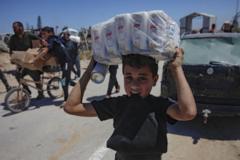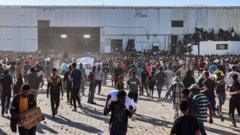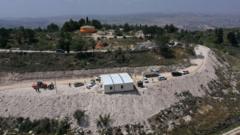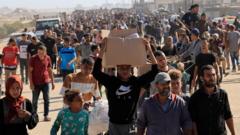A chaotic start to Israel's aid program in Gaza has led to criticism and concerns over its efficacy amidst rising tensions.
U.N. Condemns Chaotic Launch of Israeli-Backed Gaza Aid Program

U.N. Condemns Chaotic Launch of Israeli-Backed Gaza Aid Program
New aid initiative raises questions and sparks criticism among humanitarian groups and international community.
The United Nations has expressed strong condemnation of a newly launched Israeli-backed aid operation in southern Gaza after its chaotic debut on Tuesday. Thousands of desperately hungry Palestinians surged towards a food distribution center in Rafah, resulting in the Israeli military firing warning shots to control the situation. This incident has triggered further scrutiny regarding Israel’s latest strategy aimed at circumventing Hamas in providing aid.
In light of increasing international pushback against Israel’s military threats towards Hamas, including plans for a potential ground offensive, the Gaza Humanitarian Foundation, behind the aid initiative, claims to have established two distribution centers and successfully distributed thousands of aid parcels. However, the launch drew criticism from European diplomats who condemned what they perceive as a politicization of humanitarian efforts.
Kaja Kallas, the European Union’s chief diplomat, stated that the use of disproportionate force and the resulting civilian casualties are unacceptable. She emphasized that humanitarian aid efforts should never be politicized or militarized.
This shift in aid distribution is a significant departure from the United Nations-led efforts in Gaza, which have previously faced accusations from Israel of bias and incompetence in controlling aid supplies, particularly concerning Hamas. Under the new Israeli framework, security at the aid sites in southern Gaza is managed by Israeli soldiers with oversight from private U.S. contractors, aiming to provide assistance directly without UN involvement.
Critics contend that the initiative, while designed to bypass Hamas, could further complicate the humanitarian crisis in Gaza and raise ethical concerns surrounding the militarization of aid distribution and the proper care of vulnerable populations.
In light of increasing international pushback against Israel’s military threats towards Hamas, including plans for a potential ground offensive, the Gaza Humanitarian Foundation, behind the aid initiative, claims to have established two distribution centers and successfully distributed thousands of aid parcels. However, the launch drew criticism from European diplomats who condemned what they perceive as a politicization of humanitarian efforts.
Kaja Kallas, the European Union’s chief diplomat, stated that the use of disproportionate force and the resulting civilian casualties are unacceptable. She emphasized that humanitarian aid efforts should never be politicized or militarized.
This shift in aid distribution is a significant departure from the United Nations-led efforts in Gaza, which have previously faced accusations from Israel of bias and incompetence in controlling aid supplies, particularly concerning Hamas. Under the new Israeli framework, security at the aid sites in southern Gaza is managed by Israeli soldiers with oversight from private U.S. contractors, aiming to provide assistance directly without UN involvement.
Critics contend that the initiative, while designed to bypass Hamas, could further complicate the humanitarian crisis in Gaza and raise ethical concerns surrounding the militarization of aid distribution and the proper care of vulnerable populations.





















